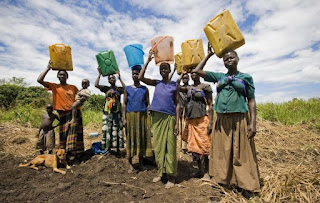A women's role: women and water collection

In this blog, I will discuss women's roles in water collection in Africa. First, it's essential to understand the prevalence of tradition in Africa, leading to a gender-based division of labour ( Kameri-Mbote, 2008) . In many African countries, customary laws support tradition, which "legitimises the subordination of women", creating gendered power imbalances ( Makina & Moyo, 2016) . This blog will build on this understanding of gender inequalities when looking at water collection. Water collection is vital, with two-thirds of sub-Saharan Africa having to collect water outside their home, which is mainly a women's role (Graham et al., 2016) . I will use the Makondo parish in Uganda to illustrate the burden of water collection. All 15 villages have no piped water, and most of the water collection is done by females (54% by women and 19% by girls) ( Asaba et al., 2013) . Women in Uganda carrying water from a shallow well in plastic jerricans A time burden